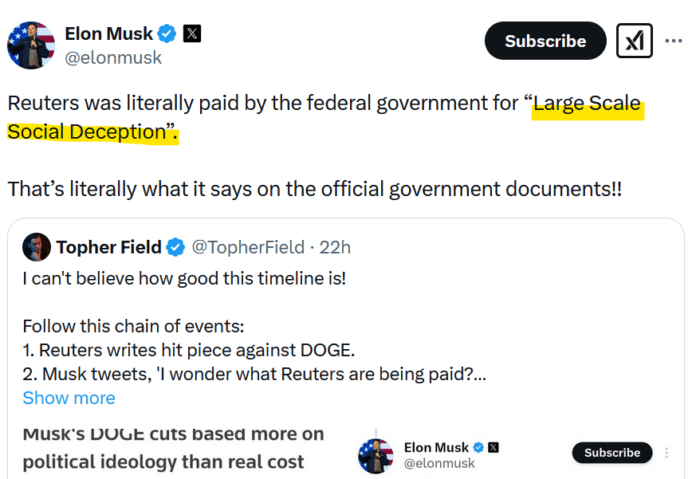The tech billionaire and the most powerful oligarch on this planet, Elon Musk, has sparked a heated controversy by accusing Reuters of engaging in “large scale social deception” funded by the U.S. government. This explosive claim, echoed by President Donald Trump, has reignited debates about media independence and government influence.
The Accusation
On February 13, 2025, Musk posted on X: “The US government paid Reuters millions of dollars for ‘large scale social deception.’ That is literally what it says on the purchase order! They’re a total scam. Just wow.”
President Trump amplified this claim, demanding: “GIVE BACK THE MONEY, NOW!”
The Adjusted Reality
However, the accusations may stem from a misinterpretation of a $9.1 million Department of Defense contract awarded in 2018 – during Trump’s first term – to Thomson Reuters Special Services (TRSS), a separate entity from the Reuters news organization. The contract, titled “Active Social Engineering Defense” (ASED), was aimed at developing defenses against cyberattacks and social engineering threats.
Key Points
- The contract was for cybersecurity research, not media manipulation.
- It was awarded during Trump’s first administration, not Biden’s.
- TRSS is legally distinct from Reuters News, with its own board and operations.
Broader Context
This controversy follows recent accusations of media weaponization, including claims about USAID and CIA support for the investigative platform OCCRP. It reflects a growing trend of scrutiny towards media funding and government relationships.
Reactions and Responses
- Steve Rubley, CEO of TRSS, stated the public discourse has “misrepresented the nature of the relationship between TRSS and the Department of Defense.”
- Reuters and other major news outlets have denied receiving government grants, clarifying that federal funds received were for subscriptions.
- Fact-checkers and journalists have debunked Musk’s claims, pointing out the mischaracterization of the contract’s purpose.
Implications
This incident raises critical questions about:
- The spread of misinformation by high-profile figures
- Public understanding of government contracts and cybersecurity initiatives
- The relationship between media organizations and government agencies
As the DOGE initiative continues its aggressive pursuit of government waste, the line between legitimate scrutiny and unfounded accusations becomes increasingly blurred.
The controversy surrounding Reuters adds to the growing list of media-related scandals that have emerged since the inception of DOGE. As the initiative continues to uncover and sometimes misrepresent government spending, it remains to be seen how this will impact public trust in both media and government institutions.





